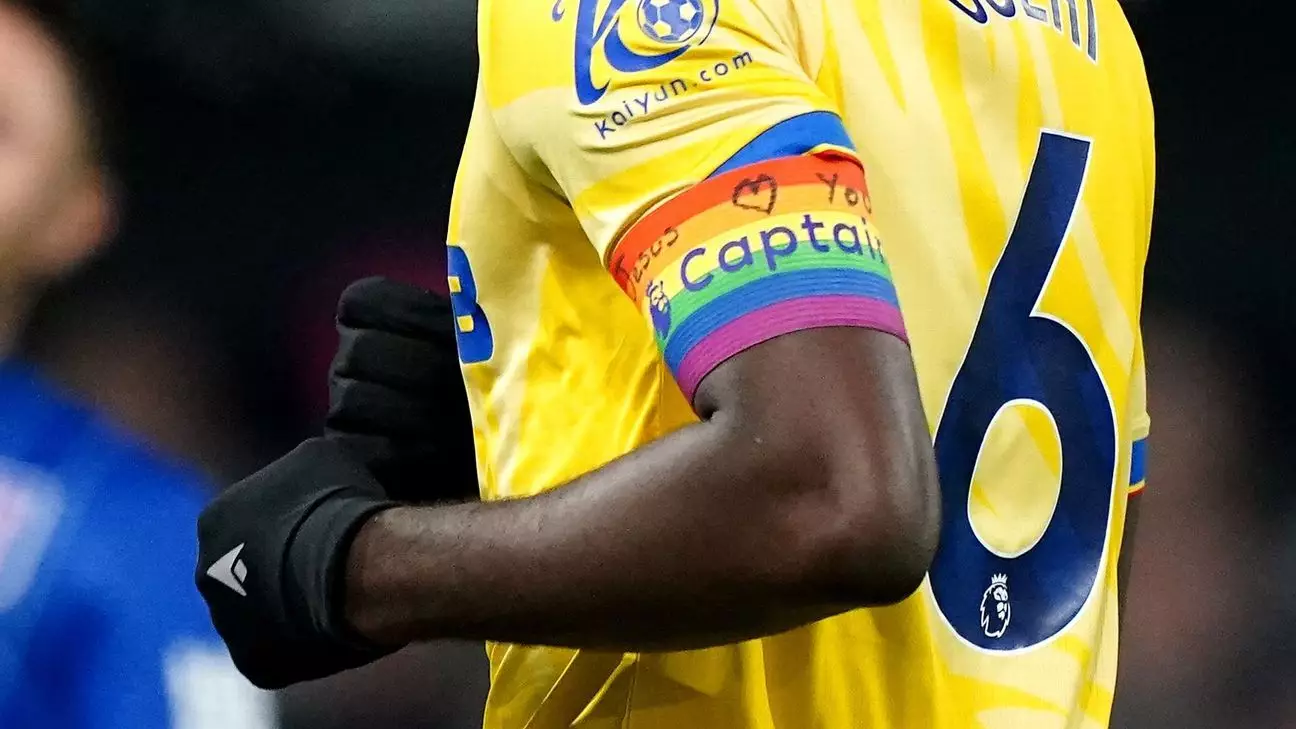In professional sports, athletes often find themselves at the crossroads where personal beliefs, social responsibilities, and regulatory frameworks intersect. The recent actions of Marc Guéhi, a Crystal Palace defender, illustrate this dynamic vividly. After writing “Jesus loves you” on his rainbow-colored captain’s armband during the match against Ipswich Town, Guéhi triggered both intrigue and controversy, leading to a reminder from the English Football Association (FA) regarding kit regulations. This incident raises profound questions about religious expression, inclusivity in sports, and the role of governing bodies in enforcing behavioral standards.
The FA’s regulations expressly prohibit religious messages or slogans on player kits, encapsulated in Rule A4. This rule reflects a concerted effort to maintain uniformity and eliminate any distractions that could arise from players expressing personal beliefs on the field. Last summer’s modifications to the Laws of the Game made this issue particularly clear: all captains must wear armbands that conform to specific guidelines that exclude personal or political statements. Guéhi’s act of inscribing religious sentiments onto an official armband positioned him in direct conflict with these established regulations, inevitably earning him an admonition despite a lack of formal repercussions.
Understanding the Context of the Incident
The incident becomes particularly complex when one considers the broader context of the rainbow-colored armbands themselves. Issued to all Premier League clubs in support of Stonewall’s Rainbow Laces campaign, these armbands signify an embrace of the LGBTQ+ community and a commitment to inclusivity within the sport. Guéhi, a devout Christian, opting to inscribe a religious message on an armband symbolizing LGBTQ+ advocacy could be interpreted in various ways—some may view it as an attempt to bridge divides, while others might see it as a misalignment of values. In achieving his personal expression of faith, Guéhi risks alienating some members of the very community the armband aims to support.
Crystal Palace’s manager, Oliver Glasner, downplayed the controversy during his post-match interview, emphasizing Guéhi’s right to express his views as an adult member of society. This underscores the necessity of open dialogue around such issues; Glasner’s comments point to a broader cultural shift towards acceptance and understanding, even in the face of conflicting viewpoints. He left it to the audience to interpret Guéhi’s actions, framing them as a personal expression rather than a direct challenge to the campaign’s LGBTQ+ message.
In contrast, responses from organizations like Stonewall and individual players illustrate the diversity of opinion surrounding this incident. The spokesperson from Stonewall applauded the general support for their campaign but may need to navigate the complexities of individual religious expressions intersecting with broader social campaigns. Meanwhile, Ipswich midfielder Sam Morsy’s decision to wear a standard black armband highlights how personal beliefs influence players differently and raises questions about the balance between individual autonomy and collective initiatives.
Marc Guéhi’s decision to write religious messages on his rainbow armband serves as a case study in the complex web that defines modern sports culture. With a sharp focus on inclusivity and representation, the regulatory frameworks in sports must adapt to accommodate the multifaceted identities of athletes. The FA’s reminder to Guéhi is not merely a disciplinary measure but a reflection of the ongoing struggle to reconcile personal beliefs with collective values in sports.
As conversations about faith, identity, and inclusivity in sport continue to evolve, it remains vital for governing bodies to foster environments where athletes can express both their identities and their beliefs without infringing upon the collective objectives of unity and inclusion. Guéhi’s actions prompt a critical examination of how we navigate these often-contentious intersections, advocating for a sport that embraces all perspectives while maintaining a commitment to mutual respect and understanding.

